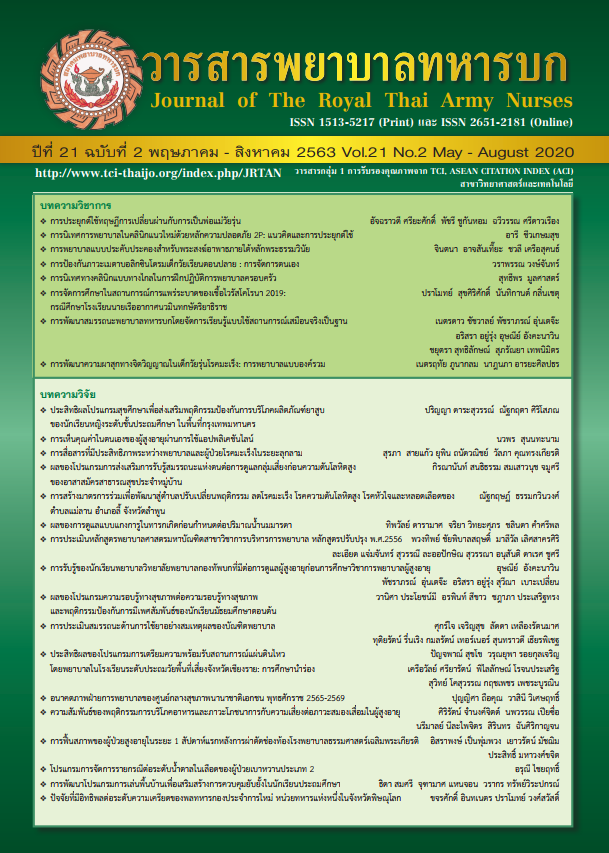Leadership and Work Engagement of staff nurses: A Systematic Review
Keywords:
Leadership, Work engagement, Registered nurse, Nursing OrganizationAbstract
The purposes of this research study were to analyze the theories of leadership and work engagement of nursing personnel, and to synthesize empirical evidence about leadership and work engagement. The samples were 24 research reports, which were selected according to the specified criteria. The Research instruments was the Quality Assessment Criteria for Research Papers. The instrument quality was evaluated by using Kappa statistics to test the consistency between assessors in the research team.
The findings of the research study showed that the transformational leadership theory is the most using leadership theory in research studies (n = 12), which is an independent variable (n = 24). For work engagement of registered nurse used three dimension measurement was primarily used (n = 23), namely vigor, dedication, and absorption. The greatest number of reports in correspondence to the leadership theories were found from 2015 to 2019 (n = 17), The data were collected by using a questionnaire (n = 24). The quality value of the research instrument was more a reliable than 0.80 (n = 21).The main parts of the research study involved in the relation between leadership and work engagement (n = 20).The secondary parts was followed by a prediction of leadership with work engagement (n = 8). Therefore, it is implied that the number of research type about leadership of Thai nurses and work engagement is minimal.
Downloads
References
Bass BM, Avolio BJ, editors. Improving organizational effectiveness through transformational leadership. Sage; 1994.
Chaleoykitti S, Thaiudom A. Development Plan for Future Nursing Leadership. Journal of the Royal Thai Army Nurses.2014; 15:148-154. (In Thai)
Bakker AB. An evidence-based model of work engagement. Current directions in psychological science. 2011 Aug; 20(4):265-9.
Wongcharoen W, Singchungchai P, Wongkhomthong PS, Meehanpong P. The Structural Equation Model of Leadership of In-Patient Unit Head Nurses as Perceived by Professional Nurses, Nurses’ Work Engagement, and Job Performance of Professional Nurses in Community Hospitals. Journal of The Royal Thai Army Nurses.2018; 19:97-106. (In Thai)
Matula P, Uon V. A causal relationship model work engagement affecting organizational citizenship behavior and job performance of professional nursing. Middle-East Journal of Scientific Research. 2016;24(5):1600-5. (In Thai)
Schaufeli WB, Bakker AB. Defining and measuring work engagement: Bringing clarity to the concept. Work engagement: A handbook of essential theory and research. 2010 Mar 10;12:10-24.
Abdelhadi, N., & Drach-Zahavy, A. Promoting patient care: work engagement as a mediator between ward service climate and patient-centred care. Journal of advanced nursing, 2012 68(6), 1276-1287
Antoinette Bargagliotti L. Work engagement in nursing: a concept analysis. Journal of advanced nursing. 2012 Jun;68(6):1414-28.
Salanova M, Lorente L, Chambel MJ, Martínez IM. Linking transformational leadership to nurses’ extra-role performance: the mediating role of self-efficacy and work engagement. Journal of advanced nursing. 2011 Oct;67(10):2256-66
Jyoti J, Bhau S. Impact of transformational leadership on job performance: Mediating role of leader–member exchange and relational identification. SAGE Open. 2015 Nov 3;5(4):2158244015612518.
Wong CA, Cummings GG, Ducharme L. The relationship between nursing leadership and patient outcomes: a systematic review update. Journal of nursing management. 2013 Jul;21(5):709-24.
Kmet LM, Cook LS, Lee RC. Standard quality assessment criteria for evaluating primary research papers from a variety of fields; 2004.
Brief AP, Weiss HM. Organizational behavior: Affect in the workplace. Annual review of psychology. 2002 Feb;53(1):279-307.
Hayati D, Charkhabi M, Naami A. The relationship between transformational leadership and work engagement in governmental hospitals nurses: a survey study. Springerplus. 2014 Dec;3(1):25
Manning J. The influence of nurse manager leadership style on staff nurse work engagement. JONA: The Journal of Nursing Administration. 2016 Sep 1;46(9):438-43.
Karatepe OM. Perceptions of organizational politics and hotel employee outcomes: the mediating role of work engagement. International Journal of Contemporary Hospitality Management. 2013 Feb 1;25(1): 82-104.
Simpson MR. Predictors of work engagement among medical-surgical registered nurses. Western journal of nursing research. 2009 Feb;31(1):44-65.
Mehmood M, Awais M, Rahat Q, Raza S, Khalid U. Achieving Organizational Effectiveness Through Employee Engagement: A Role of Leadership Style in Workplace. International Journal of Engineering and Information Systems. 2017; 1:41-9.
Abdelhadi N, Drach-Zahavy A. Promoting patient care: work engagement as a mediator between ward service climate and patient-centred care. Journal of advanced nursing. 2012 Jun;68(6):1276-87.
Watcharakate S. Transformational Leadership: The Challenging of the Nurse Leaders. Journal of The Royal Thai Army Nurses. 2014; 15(3): 58-63. (In Thai)
Downloads
Published
How to Cite
Issue
Section
License
บทความหรือข้อคิดเห็นใดใดที่ปรากฏในวารสารพยาบาลทหารบกเป็นวรรณกรรมของผู้เขียน ซึ่งบรรณาธิการหรือสมาคมพยาบาลทหารบก ไม่จำเป็นต้องเห็นด้วย
บทความที่ได้รับการตีพิมพ์เป็นลิขสิทธิ์ของวารสารพยาบาลทหารบก
The ideas and opinions expressed in the Journal of The Royal Thai Army Nurses are those of the authors and not necessarily those
of the editor or Royal Thai Army Nurses Association.






